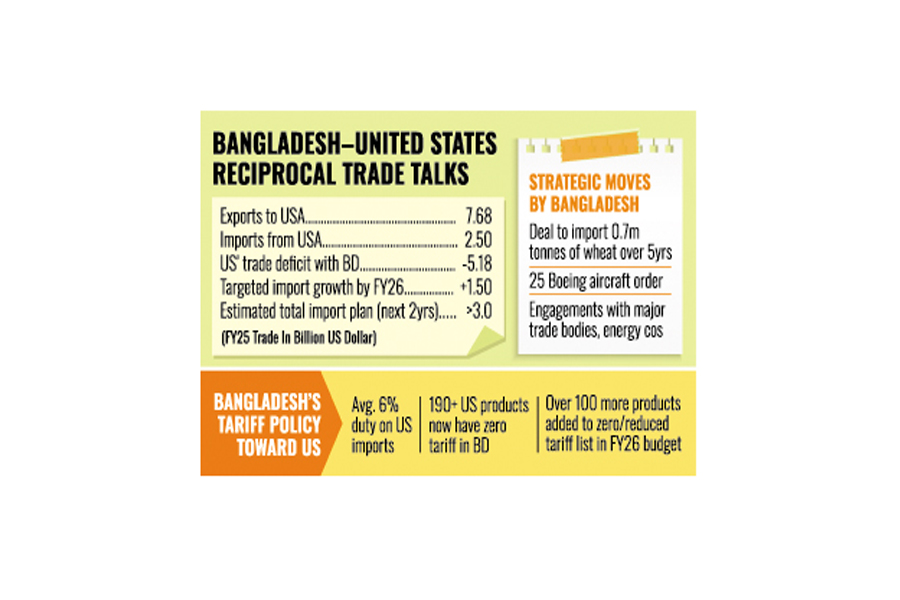
Published :
Updated :

Bangladesh is expected to assure increasing import volume from the US by US$1.5 billion over next one and a half years as part of a tradeoff package for a probable tariff deal.
An official source says Bangladesh and the US are expected to sign a deal titled 'Agreement on Reciprocal Trade Framework' if both sides are agreed on their desired demands.
A commerce ministry source gave the import-augmentation indication Monday as a high-powered government delegation left for Washington amid cautious optimism for a fair and square deal to avert the antedated 35-percent prohibitive duties on Bangladeshi exports.
Dhaka is likely to make the offer to the United States Trade Representative during the meetings on reciprocal tariff scheduled for July 29-31 in Washington, DC, he added.
The Bangladesh delegation, headed by Commerce Adviser of the incumbent interim government Sk Bashir Uddin, left Dhaka for the United States on Monday afternoon to resume the third-round negotiations with the United States Trade Representative (USTR) to avert the jacked-up tariffs slapped on products exported to the US market from Bangladesh.
The other members of the delegation are National Security adviser Khalilur Rahman, commerce secretary Mahbubur Rahman and additional Secretary Nazneen Kawshar Chowdhury.
They all are optimistic about securing a fairer tariff deal or rate during the tariff talks, sources said.
Meanwhile, Bangladesh placed order for the purchase of 25 Boeing aircraft from the US with a view to securing a fairer tariff rate from the US administration.
Earlier, Bangladesh already inked a deal with to import 0.7 million tonnes of US wheat within next five years. Of the volume, in the first year, it will import 0.220 million tonnes of the grain.
According to the Bangladesh import plans -- meant for bridging the bilateral trade gap -- the cost is estimated to come to more than $3.0 billion.
A year ago, in the fiscal year 2023-24, Bangladesh's goods worth $7.68 billion were exported. In contrast, Bangladesh imported goods worth $2.5 billion from the country in the fiscal year 2024-25.
The largest single product imported from the United States is iron scraps or iron pieces. And the single-largest export to the US is ready-made garments.
Bangladesh's several businesspersons are now staying in the USA for negotiating with their trade partners. Besides, they will discuss soybean-and wheat-import issues with respective business partners.
A senior commerce official, who is involved with the tariff issue, hopes that the US "may offer good tariff rates in favour of Bangladesh as US President Donald Trump has reduced the additional tariffs on some countries".
The commerce ministry completed discussions with the Bangladeshi businesses, economists, and relevant ministries, for feedback ahead of the third round of negotiations with the United States Trade Representative regarding the trade agreement on the reciprocal tariff imposed by the US administration.
The ministry already sat with US Wheat Associates (USW), Chevron and Excelerate Energy, US Soybean Export Council (USSEC) and US Cotton Association.
Also was sitting with the American Apparel and Footwear Association (AAFA) on July 22.
More than 100 products have been added to this list in the 2025-26 fiscal budget to provide the facility for not only the US but also other countries. Bangladesh has already kept tariffs on 190 products at zero to reduce its trade deficit with the United States.
Currently, Bangladesh levies an average of 6.0-percent duty on products imported from the United States.
On July 07 last, the Trump administration declared a plan to impose 35-percent tariff on products exported to the US market from Bangladesh, with effect from August 01, 2025.
To this end, US President Donald J Trump sent a letter to the Chief Adviser of the Bangladesh interim government, Muhammad Yunus. The new tariff is 2.0-percent lower than the initially declared rate of 37 per cent, issued three months ago, dated April 02 last. It was supposed to take effect from April 09.
The National Security Adviser and the Commerce Adviser of Bangladesh already sat in a meeting with the USTR representatives on July 03. The meeting ended sans decision.
In the meantime, various countries have completed necessary process signing bilateral agreements with the United States through negotiations. Bangladesh is also trying to strike a bilateral agreement.
That is why a delegation led by the commerce adviser held several meetings with the USTR. However, Bangladesh and the US could not agree on all issues in the last talks.
The third and final day of the second round of negotiations on the tariff issue between Bangladesh and the US concluded on July 11, 2025.
However, as several issues remained unresolved in the tariff talks, both nations decided to continue inter-ministerial discussions.
rezamumu@gmail.com


 For all latest news, follow The Financial Express Google News channel.
For all latest news, follow The Financial Express Google News channel.